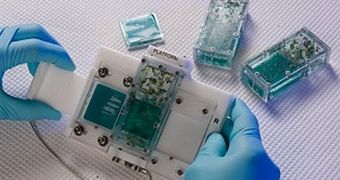Officials at the American space agency announced recently that a new experiment meant to study fruit flies would fly to the International Space Station (ISS) in late 2014. The common fly, known as Drosophila melanogaster, is shaping up to be one of the most attractive non-human models for biologists.
NASA researchers figured out some time ago that the small fruit fly made for an extraordinary biomedical research model. Scientists on Earth have used it extensively to develop new theories on the origins of numerous diseases affecting animals, including humans.
The ISS experiment will study fruit flies in space in order to understand how whole organisms react to spaceflight, from molecular, genetic, cellular, and physiological points of view. This is made possible by the fact that humans and Drosophila share the same building blocks of life.
The fruit fly has already aided biologists in a number of studies. These creatures multiply within days, and they take up very little room. Their short life cycle enables researchers to model the evolution of diseases that would take decades to map in the human body.
In the latest report from the National Research Council in Washington, DC, experts wrote that NASA should focus on studying biological model in space. As such, the latest experiment was developed for installation on the space station, where experts can study Drosophila in microgravity.
The experiment, called the Fruit Fly Lab, is currently being developed by experts at the NASA Ames Research Center (ARC) in Moffett Field, California. While this is not the first Drosophila experiment to fly on the space lab, it will be the longest and most capable, researchers say.
Through the use of small rotating devices called NanoRacks centrifuges, ISS astronauts will be able to measure the fruit flies' response to 1g accelerations, identical to that on Earth's surface, to 0g acceleration such as that found in space, and to fractional g acceleration, such as on Mars or the Moon.
The Fruit Fly Lab could potentially provide new insights into a series of conditions affecting the human immune system. Numerous such studies have already been conducted on Drosophila, but microgravity will enable researchers to refine their results even further.
“Since the human immune system is complex, we used the Drosophila model to tease out the effects of spaceflight on the simpler innate immune system of the fruit fly, focusing on molecular pathways that perform similar functions in the human immune system,” says ARC Space Biosciences Division scientist Sharmila Bhattacharya, PhD.
The experiment will be taken to space aboard a Dragon space capsule developed by Hawthorne, California-based Space Exploration Technologies Corporation (SpaceX), during a resupply mission to the ISS.

 14 DAY TRIAL //
14 DAY TRIAL //